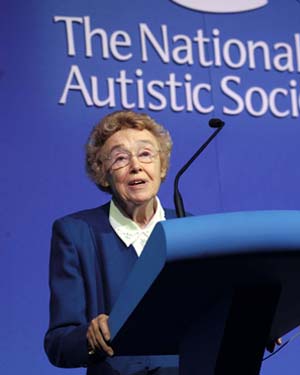 Sans elle, les travaux d’Hans Asperger seraient peut-être encore restés très longtemps dans les oubliettes où ils étaient tombés durant près de 40 ans…
Sans elle, les travaux d’Hans Asperger seraient peut-être encore restés très longtemps dans les oubliettes où ils étaient tombés durant près de 40 ans…
Sans elle, le terme même de « syndrome d’Asperger » n’existerait probablement pas…
Lorna Wing, psychiatre britannique ayant exhumé en 1981 la thèse d’un pédiatre autrichien, oubliée de tous pendant près de 4 décennies est morte, le 06 juin dernier, à l’âge de 85 ans ![]()
Le Dr Wing a développé le concept de l’autisme comme une condition du spectre dès les années 1970, & elle a plus tard inventé le terme de syndrome d’Asperger.
Son travail a révolutionné la façon dont l’autisme était alors considéré, & son influence s’est fait sentir partout à travers le monde.
Elle était aussi une des fondatrice de la National Autistic Society qui lui rend hommage avec cette tribune ![]()
En France, pas un mot dans les médias ![]()
Il y a en revanche un très bel article dans le New York Times : « Dr. Lorna Wing, Who Broadened Views of Autism, Dies at 85 »
Dr. Lorna Wing, a British psychiatrist who was instrumental in identifying autism as a mental disorder of many gradations, affecting people across the spectrum of intelligence — and who gave autism in its mildest form the name Asperger’s syndrome — died on June 6 in Kent, England. She was 85.
Her death, from complications of Alzheimer’s disease, was announced by the National Autistic Society, an advocacy and service organization she helped found in Britain in 1962, in part to fill a void she and her husband encountered while seeking help for their own autistic daughter.
Dr. Wing helped redraw the map of a behavioral terrain that was virtually unheard-of until the mid-20th century and that now, partly as a result of her insights, is said to affect the lives of roughly one out of every 70 people in the world. She is widely credited with recognizing autism as a spectrum of related problems, rather than as a single condition.
She is best known for rediscovering the work of Hans Asperger, an Austrian psychiatrist who first described a form of autism in a group of intelligent, verbally adroit boys who were indifferent to their schoolwork but intensely interested in one or two subjects, like trains, dinosaurs or royal genealogy. The “little professors,” as he called them, shared many of the usual problems common to autism: inability to make friends, repetitive behaviors, distress at any break in routine.
POUR lire l’ARTICLE en INTÉGRALITÉ ![]() c’est par ici !
c’est par ici !












Voilà une femme qui a fait oeuvre utile.